Why I Refuse to "Hook" My Audience and "Perform" for Subscriptions
Sorry, Substack Influencers and Hustle Culture (but, also, not sorry).
“For what will it profit a man if he gains the whole world, and loses his own soul?”
—MARK 8:36
1.
So, I was up late last night…
(Don’t you love it when stories start this way?)
…scrolling my Substack feed.
And as I perused the smattering of local fare—theology, the arts, poetry, culture—I felt my body become more and more tense because, among my typical delights, were Substack influencers and posts about what I need to be doing to make myself “trend” and “grow” and be “better.”
Apparently, there are very specific things “serious” writers do here if they are serious about their writing.
Apparently, the “successful” writers have figured it out. They are widely read, trending, thriving, pulling in subscriptions left and right, and appearing on “best of” charts. You name it.
And apparently, I. am. not. one. of. them. (sigh…)
And, just like that, I was in high school again, with that proverbial seed of doubt inside my chest, raising her hand to speak: “Are we doing this wrong?” “Why aren’t we growing like the others?” “Why aren’t we trending?”
2.
Oh, friend. Isn’t that just the worst? I’m 42, for crying out loud. My degrees are in English. I am a professor. I am a writer. I have written two books. I am nearly done with my doctorate (It’s almost dissertation time!). I teach writers as their editor, mentor, and creative counselor for a living (Thank you, God!).
And yet.
The hustle comes for all of us. The doubt is vicious. The comparison game won’t quit. The noise we thought we had silenced long ago becomes a cacophony yet again.
What’s a writer to do?
Well, first we lament publicly, of course.
And that’s exactly what I did last night when I caught myself in the creative’s death spiral.
I said to myself, “Wait a minute! What are you doing? Haven’t we learned anything?” And then I wrote this, which hit a nerve with many of you:
And here’s what you said (And WOW, what a blessing you all are!):
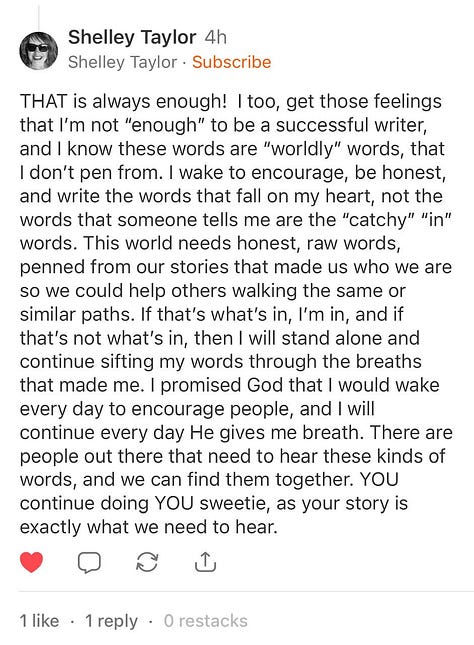
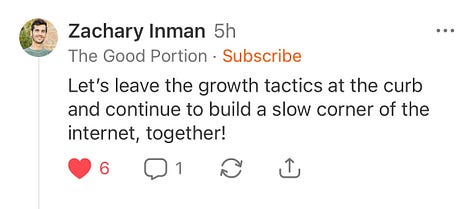
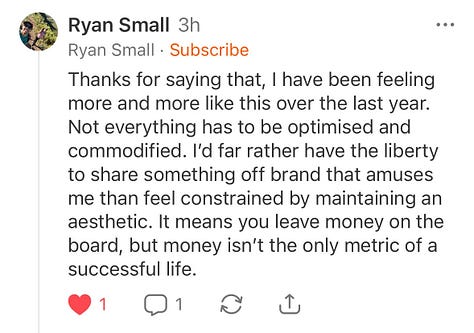
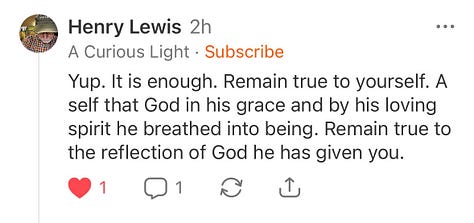
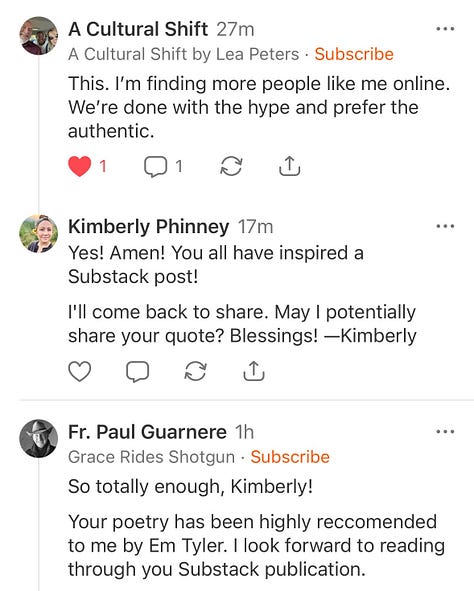
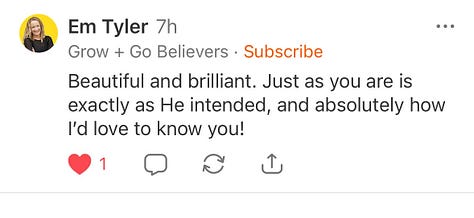
(Thank you,
, , , , , , and for your kind engagement in this conversation—as well as many more.)So, here’s the truth for me. I don’t begrudge anyone for how they want to show up in this space (or any other digital platform). What feels right and authentic for them might be entirely different from what is right and authentic for me. Let’s be real. I’m an introvert. An empath. An INFJ (Where are my Myers-Briggs people?). A Highly Sensitive Person (HSP is a real thing. Check it out here.). An intellectual. A chronic illness warrior.
And because of these things, I simply cannot (and will not) keep up with the Joneses of Substack (or Instagram… or TikTok [I don’t even have a TikTok.]).
It’s not healthy for me.
And I suspect, based on your responses, that it’s not healthy for you either.
3.
But here’s the thing that digs even deeper than all of the things I am—and all of the things you are.
It’s not really about who we are—but whose1 we are that’s caused me to respond so strongly to the hustle culture all around us. Again, I don’t begrudge others’ shininess or ingenuity. I don’t begrudge Substack either (I love Substack).
What I begrudge is the pervasive messaging saturating the air—and what it does to the human soul when it goes unchecked. It has been the ethos of our nation, in particular, for many years—maybe even since our founding (in one way or another).
Some have termed it the “dark side” of the American Dream.
F. Scott Fitzgerald captured this sublimely in the embodiment of Jay Gatsby (…the professor leaves to find her treasured, worn copy littered in years of glowing marginalia… she flips to page 64 in chapter 4 where Nick Carraway, our narrator, describes his early impressions of Jay Gatsby…):
“He was balancing himself on the dashboard of his car with the resourcefulness of movement that is so peculiarly American—that comes, I suppose, with the absence of lifting work or rigid sitting in youth and, even more, with the formless grace of our nervous, sporadic games. This quality was continually breaking through his punctilious manner in the shape of restlessness. He was never quite still; there was always a tapping foot somewhere or the impatient opening and closing of a hand…”
And for most of us, we know how things ended for our titular Gatsby—or should I say James Gatz?
It wasn’t good.
At first blush, The Great Gatsby is a salacious love triangle gone bad in the 1920s. Sadly, this surface reading is what nearly doomed Fitzgerald’s magnum opus (along with the poor timing2). What he meant it to be was a sharp and timeless satire—one that is so close to the cultural zeitgeist that it feels too real to look away without looking “within and without” first.
But to the spiritually sensitive3, The Great Gatsby is a potent religious allegory. As a defunct Catholic and voracious drunk, I suspect, based on the text and his biography, that Fitzgerald was grappling with his faith and the nature of virtues and vices. Each character was a careful meditation on one virtue/vice paradigm or another4: Tom lusted and raged; Daisy was slothful and greedy; Gatsby struggled with pride and envy…
The list goes on…
4.
So, you might be wondering why a sharp left turn toward literature and the American Dream? We were talking about Substack!
I hear you.
So, let’s get this ship sailing in the right direction again, shall we?
Well, Jay Gatsby’s rise and fall reminded me of… myself. I would tell my students this, and they would laugh out loud: “Mrs. Phinney, you’re not a bootlegger! You’re nothing like Gatsby!”
I’d laugh with them and confess I wasn’t a bootlegger or had connections with the mob or a shady past, and that, yes, Kimberly Phinney was indeed my real name.
But then I would tell them—with a straight face—this: “Laugh as you’d like, but WE ARE ALL GATSBY.”
Of course, they’d get quiet. How could this be so?
I’d continue: “We are all swimming in the ocean of the American Dream. It is a part of the current. But on an even deeper level—a spiritual one—we are all hustling and striving and sometimes overextending our reach. We want to be more beautiful. More intelligent. More successful. More wealthy. More esteemed. Beauty is good. Intelligence, success, stability—those are all good things, too. It’s the “MORE” that is killing us. It is the “MORE” that killed Gatsby. He overextended his reach. He was never satisfied. In Daisy’s own words, he “wanted too much.” He placed his worth—his identity—in the world’s hands and in his own fallible hands, too. And look what happened to him? He drowned in it!”
This epiphany was always the pinnacle moment of class. The revelation never got old. Year after year, students were stirred awake. Year after year, I was stirred awake, too.
The Great Gatsby is a modern Ecclesiastes.
And Gatsby’s demise was a warning (a siren song)—one I yield to, again and again, to this very day—one I wish Fitzgerald could have yielded to himself. But his shadows were too dark, and he had turned his back on the Light one too many times5.
5.
So here we are.
I think we have come to the end of what I needed to tell you, dear reader (and dearest writer).
I won’t be writing snazzy “hooks” or “performing” a song or dance for you. I won’t be shiny and slick. I won’t strive for trends, chase algorithms, or give you my hot take on a hot topic.
I can’t allow myself to chase hustle culture—here on Substack or anywhere else. I have seen too much. I have lived too much. I have suffered too much. I have come too far.
I suspect you have, too. And I suspect this is why you responded so strongly to my public lament on Substack notes.
It feels good to be seen, doesn’t it?
If anything, I hope this meditation helps to shed light on who I am, why I write, and my intentions here. But I hope most of all that it gives you a certain kind of permission to just. be. you.
The pressures are real. They lick at our heels with each Netflix show, advertisement, and Instagram reel. It all shouts, “MORE.”
As if we are not already “more” because we are already loved, known, and redeemed.
If only Gatsby had known the one true God. If only he was reading his Bible instead of the stock market and the mocking eyes of East-Eggers who whispered, “You’ll never be enough.” If only Gatsby had reached for the one true God and not the green light, which sat at the edge of Daisy’s dock—an ever-evolving symbol for what we want, what we worship, what we hope for, and what we can never have.
The same goes for Fitzgerald.
The same goes for me.
The same goes for you.
If I am going to be worth anything to you or myself—and keep my soul intact—I need to just be me—being exactly how God made me and doing exactly what God called me to do.
Who’s in?
You belong here,
me
Preorder my best-selling poetry book, Exalted Ground: Poems of Praise and Lament for the Living, out April 7. It’s just in time for National Poetry Month!
If you are interested in all things The Great Gatsby, I highly recommend Maureen Corrigan’s book So We Read On: How The Great Gatsby Came to Be and Why It Endures. It’s well-written, interesting, and informative. As a Gatsby scholar myself, this is one of my favorite books.
I was able to spend nearly a decade teaching Gatsby to AP students at a Christian school, so discussions were rich.
I highly recommend
’s book On Reading Well: Finding the Good Life through Great Books if you’d like to deep-dive into Gatsby and other famous literary works through the lens of virtues. She covers classics like The Great Gatsby, The Adventures of Huckleberry Finn, The Road, Pilgrim’s Progress, The Tale of Two Cites, Persuasion, and more. I used it in my classroom, and it’s phenomenal.






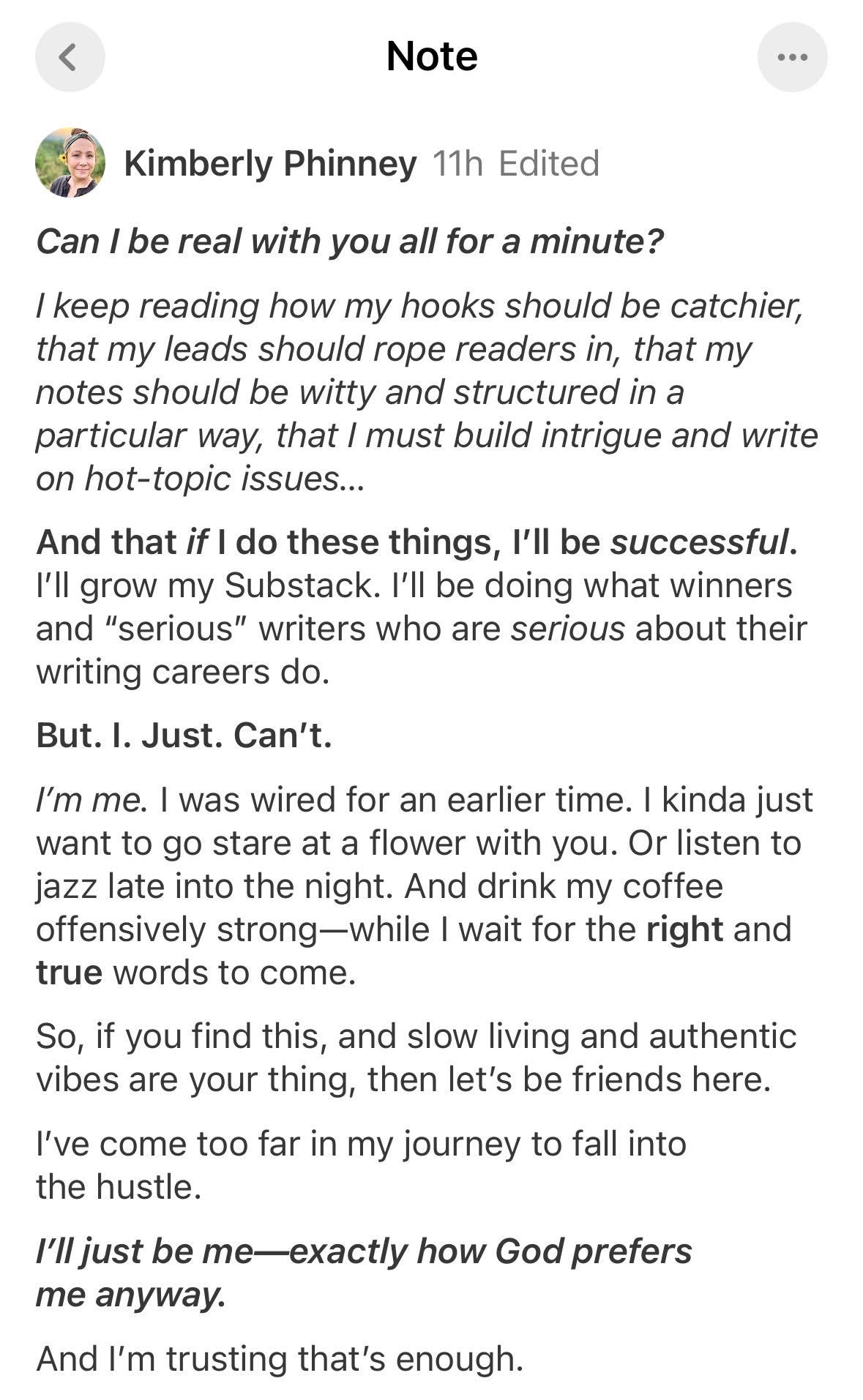

Love it 🙌💗 Social media is not worth our wellbeing. I’ve decided to show up to post and limit my scrolling — and take weekend sabbaths. Just that practice alone is making a huge difference.
Thank you for this! When I feel like I have to "follow the rules" my creativity dries up. My words are inspired by my life, nature, and what God puts on my heart to write about. Isn't that how it should be as this gift of writing was given to me by the greatest Creator of all? Amen!